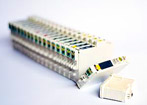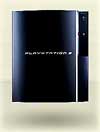A new 'secure' mobile phone designed to stop staff spying on their employers and prevent data theft was unveiled today by Japan's largest mobile phone firm. The device incorporates an unprecedented number of restrictions on its use.
Users must first prove their identity via a biometric fingerprint pad to start using the phone. Although the phone has a camera, memory slot and USB port, they are all permanently disabled, to prevent it being used to photograph documents, steal files or spread malware. If the handset is lost or stolen, all information in it can be remotely wiped by a signal from the operator.
 The F903iBSC is designed for corporations to present to their staff, according to network operator NTT DoCoMo.
The F903iBSC is designed for corporations to present to their staff, according to network operator NTT DoCoMo.
Among other functions that the business phone does not have are a music player or pre-installed Java games or other applications. The handset's phonebook is limited to only 101 entries, to prevent information leakage, according to DoCoMo.
Despite its lack of features, the 3G clamshell phone weighs 130 grams.
It is available only in black.
With more than 52.3 million subscribers, NTT DoCoMo controls more than half of Japan's mobile phone market. However, as all potential mobile phone buyers in Japan already own a phone, expansion has become increasingly difficult for the mobile internet pioneer. This has forced DoCoMo to explore creative new market niches, such as phone sales to pre-school children, and the new locked-down business phone.
In related news NTT was forced to recall a quarter of a million mobile phone SIM cards yesterday. The cards could malfunction, leaving international users without any phone access, the company announced, according to Kyodo News.









